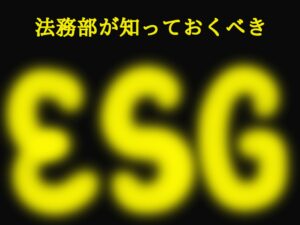
This is the transcript of the second episode of T&P’s video series “ESG Insights for Legal Departments.” Please visit T&P’s website for the video in Japanese.
https://www.tanabe-partners.com
Goi: Welcome to the second episode of “ESG Insights for Legal Departments.” Today, let’s delve into the significance of mandatory disclosure in Europe, focusing on the Corporate Sustainability Reporting Directive (CSRD) and the European Sustainability Reporting Standard (ESRS). How impactful are European disclosure regulations for Japanese companies?
Yasuhiko: Our ESG study group uncovered a compelling trend. Initially focused on understanding SASB and ISSB voluntary standards, this group increasingly turned to mandatory disclosure topics. In Japan, mandatory disclosure means the annual securities report with a limited scope, but in Europe, a lot of items are the subject of mandatory disclosure.
Goi: Have there been recent developments in European disclosure regulations?
Yasuhiko: Indeed, in January 2023, the EU approved the legally binding Corporate Sustainability Reporting Directive (CSRD) and introduced the European Sustainability Reporting Standards (ESRS) in July as its corresponding reporting standard. Importantly, the CSRD extends beyond large and listed EU companies, applying also to non-EU companies with substantial revenue in the EU.
Goi: What were the primary concerns among study group participants?
Yasuhiko: Interestingly, the focus wasn’t solely on reporting content but rather on the implementation timeline. With most European companies concluding their fiscal year in December, aligning with the calendar year, confusion arose for Japanese companies ending their fiscal year in March. Uncertainty about fiscal year specification posed a significant challenge for those managing preparatory projects, involving substantial investment and organizational efforts. Moreover, companies facing sudden revenue increases risk falling under these regulations without adequate preparation.
Goi: Let’s discuss third-party assurance under CSRD.
Yasuhiko: Absolutely. Collecting data for disclosure is challenging, and obtaining assurance adds complexity. In one workshop, an auditing firm representative highlighted the practical challenges, especially as auditing standards yet to be established. The issue of assurance isn’t confined to the EU but will likely become relevant in Japan as well, becoming an essential consideration in disclosure practices.
Goi: Could you elaborate on SFDR?
Hashimoto: SFDR primarily targets financial institutions in contrast to CSRD, focusing on operating companies. A member of our study group, a financial market participant, noted how CSRD and SFDR seem to work in sync, encouraging investment in green businesses.
Goi: Does SFDR apply to Japanese companies?
Hashimoto: Even Japanese asset management firms come under SFDR if they manage investment trusts within the EU. European disclosure regulations increasingly impact Japanese companies, requiring proactive attention from their Legal Departments.
Goi: While Japanese Legal Departments excel in understanding local law, handling foreign regulations might seem overwhelming.
Hashimoto: That view is partly accurate but somewhat outdated. Corporate activities transcend borders, expanding the Legal Department’s role beyond domestic laws. An emerging trend expects headquarter Legal teams to integrate legal functions across countries, leveraging external law firms to fortify corporate strategy and risk management. ESG activities significantly influence a company’s strategy, and neglecting them exposes significant risks, including legal ones.
Goi: How about recent regulation developments in Japan?
Yasuhiko: The Disclosure Ordinance underwent amendments, applicable to annual securities reports ending on or after March 31, 2023. The amendment requires companies to detail their “Sustainability-related approach and initiatives” within the Business Status section. Challenges arose in deciding the content and extent of disclosure in this section due to the lack of a defined standard.
Goi: Let’s address a significant issue in the current approach: the treatment of the four components within the TCFD.
Hashimoto: These components – “Strategy”, “Governance”, “Risk Management”, and “Metrics and Targets” – are fundamental to the TCFD concept. However, the classification into “material” and “not material” raised doubts among experts, leading to questions and explanations during the public comment phase.
Goi: How should the Legal Department address this issue?
Hashimoto: While interpreting laws and regulations is traditional, a forward-looking Legal Department could recommend broader and richer disclosure from a policy perspective. Merely aiming for the bare minimum doesn’t align with investor expectations, especially as ESG disclosure shifts from voluntary to mandatory.
Goi: In today’s discussion on “ESG Insights for Legal Departments,” we explored the mandatory disclosure system in Europe and its implications for Japanese companies’ Legal Departments. Thank you for an enlightening discussion.
